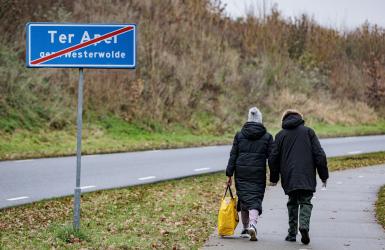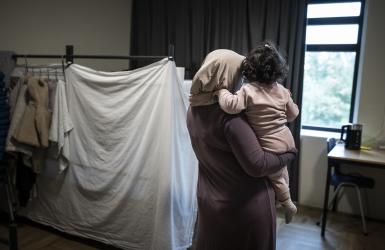The IND (decision moratorium) does not reject current asylum applications, but does not grant residence permits either. Nor does the IND process new asylum applications from this group. During the moratorium, the Repatriation and Departure Service (DT&V) (departure moratorium) does not send asylum seekers who have exhausted all legal means back to the conflict area. So a decision and departure moratorium actually consists of two parts which, in practice, are always instituted together.
There is reception, but no family reunifications
All asylum seekers who come under the moratorium have a right inter alia to reception and healthcare in the Netherlands. Because these asylum seekers do not yet have residence permits, they cannot have family members come to the Netherlands. Such a permit is in fact a condition for family reunification.
Stop in uncertain situations
Instituting a decision and departure moratorium enables the Minister of Asylum and Migration to wait and see how a conflict develops, because this situation is expected to be uncertain in any case for a short period. Violence can flare up, but the situation in the country or territory can also become more stable. Because of this asylum seekers may have additional reasons in that period to apply for asylum, but it is also possible that these reasons will actually disappear.
In the starting period of a conflict there is not much information about the situation in the territory. A moratorium enables the Ministry of Foreign Affairs to investigate this. Based on the outcomes, the Minister of Asylum and Migration makes well substantiated policy for the conflict area, with rules and guidelines for asylum applications. That can take some time..
A half year initially
A decision and departure moratorium initially lasts six months. The Minister can extend the moratorium by another six months. A departure moratorium can last one year at most, but a decision moratorium does not have a legal maximum. In practice, because it is a temporary means, it often last one year at most.
For a country, territory or group
The moratorium can apply to a country, territory or to a certain group of people. Countries to which a decision and departure moratorium applied in the past are, for example Ukraine and Afghanistan. An example of such a group: Russian men from 18 to 27 years old who have been called up but refuse military service because of the war in Ukraine.
A decision moratorium applies only to people with the nationality of the country to which the moratorium applies. A departure moratorium applies to everyone who is sent back to that country after a rejection. This is to prevent that this group can also end up in an unsafe situation.
Postponement of decisions
Because at the time of a moratorium there is no policy against which the applications can be tested, the IND does not take decisions during the moratorium. We postpone decisions on current applications and extend the decision period by one year, up to 21 months at most. When new applications are received, we only hold an initial interview (application interview) to determine whether the person falls under the moratorium. If so, we pause the process afterwards. If someone falling under the moratorium has received a rejection before and has appealed against it, then the IND withdraws the case until there is clarity.
Sometimes indeed a decision
In some cases the IND does take a decision on an asylum application during a moratorium. If someone already has a residence permit in a different European country or has applied for asylum there earlier, then we reject the application. We do so because in this situation the other country is then responsible for the asylum application (Dublin Regulation).
And when the extended decision period of 21 month has been reached, we get back to the application again. The IND will decide these cases on the individual merits of the case and the information known at that time.



